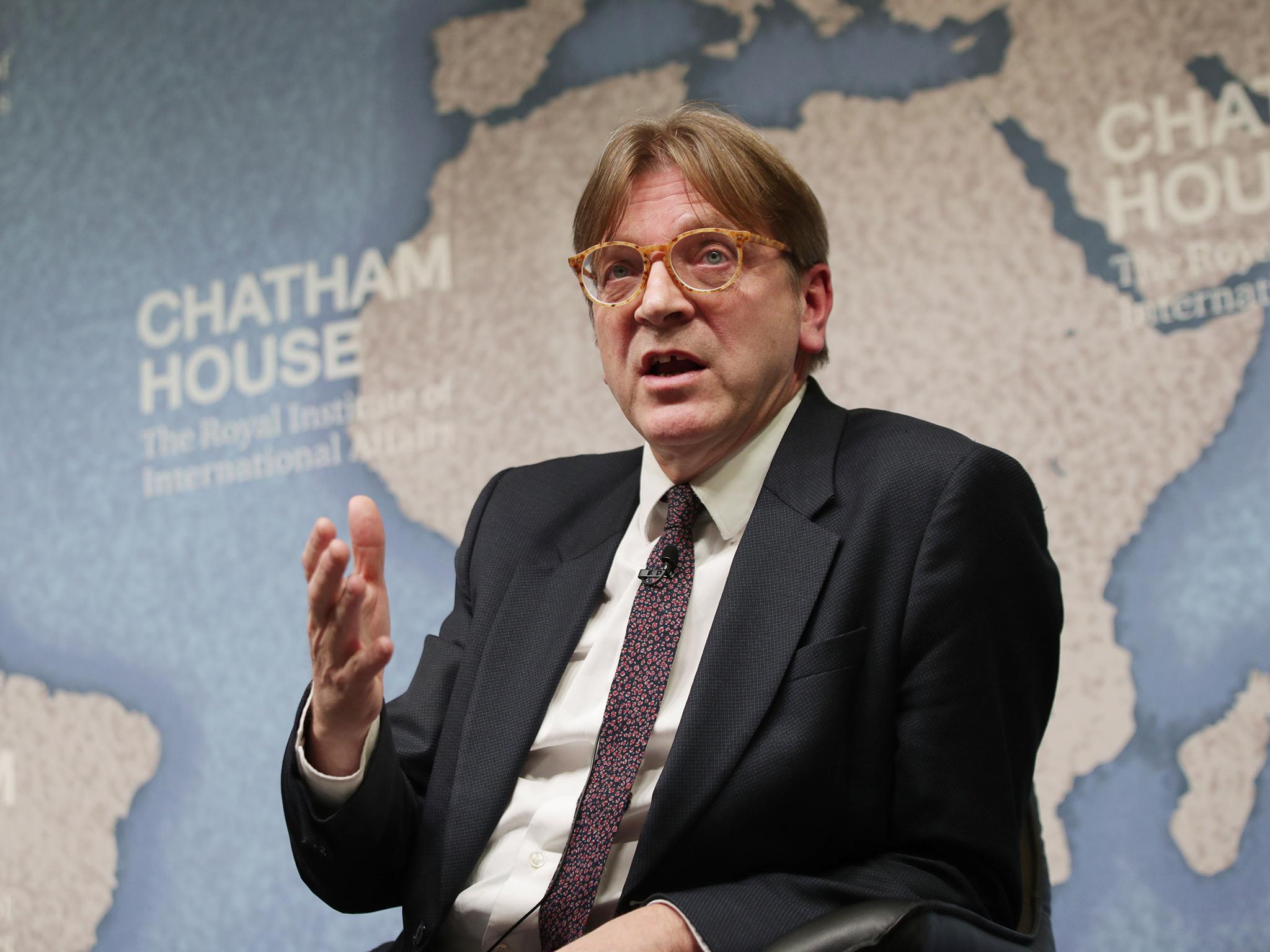Brexit: Theresa May's plan for EU migrant registry shot down by Guy Verhofstadt
He says the UK cannot 'cherry pick' the parts of EU membership it wants to maintain during the transition period

Your support helps us to tell the story
From reproductive rights to climate change to Big Tech, The Independent is on the ground when the story is developing. Whether it's investigating the financials of Elon Musk's pro-Trump PAC or producing our latest documentary, 'The A Word', which shines a light on the American women fighting for reproductive rights, we know how important it is to parse out the facts from the messaging.
At such a critical moment in US history, we need reporters on the ground. Your donation allows us to keep sending journalists to speak to both sides of the story.
The Independent is trusted by Americans across the entire political spectrum. And unlike many other quality news outlets, we choose not to lock Americans out of our reporting and analysis with paywalls. We believe quality journalism should be available to everyone, paid for by those who can afford it.
Your support makes all the difference.The chief Brexit coordinator for the European Parliament, Guy Verhofstadt, has said Theresa May's plan for a EU migrant registration scheme is "out of question".
Mr Verhofstadt, who has frequently criticised the UK's approach to the Brexit negotiations, praised the Prime Minister for "finally" conceding that the UK will need a transition period after it officially withdraws from the EU in March 2019 but said in order for it to work the UK could not "cherry pick" which parts of EU membership they wanted to keep.
He said this means "a new registration mechanism for EU citizens going to live and/or work in the UK is out of the question".
His comments followed a speech given by Ms May in Florence, Italy where she fleshed out the UK's negotiating position on Brexit.
She said the UK would have to agree to a transition deal with the rest of the EU will it hashes out the details of its exit.
Currently the UK is scheduled to crash out of the EU, lose access to its markets and revert to trading under World Trade Organisation rules in March 2019 if the two sides cannot reach an agreement.
But Ms May has now said the UK will work to make sure there are transitory arrangements in place to help businesses and institutions make the transition to being outside the EU much easier – but repeated the rallying cry of many arch-Brexiteers in the Cabinet who claim "no deal is better than a bad deal".
She proposed that people from the EU would still be allowed to come to live and work in the UK during this transition period but they would be subject to "a registration system" – which she said was "an essential preparation for the new regime".
Writing on Facebook, Mr Verhofstadt said: "The European Parliament has made it very clear from the beginning that for us it is: citizens first. We need to be very cautious, and I want to see how, next week, when the negotiations resume, the UK government intends to guarantee that the rulings of the European Court of Justice will be fully taken on board by UK courts.
"The protection of the rights of our EU citizens living in Britain must be absolute and beyond any doubt.
"I repeat that the new 'settled status', as proposed by the UK Government, is hugely problematic in that respect as it will create an enormous administrative burden and uncertainty for millions of our citizens."
Mr Verhodstadt also raised concerns that there were still major issues with the Brexit negotiations that Ms May had not resolved such as the question of the Irish border and the final financial settlement.
He said: "On the financial settlement, Prime Minister May brought some additional clarifications but also here important questions remain.
"While on the one hand the UK Government speaks of 'honoring all commitments made during membership', on the other hand the Prime Minister suggests payments will be limited until 2020, while the transition period goes beyond 2020 and some commitments will only produce payments after that date.
"The UK government will have to come up with concrete proposals next week, during the fourth round of negotiations to bring full clarity.
"Apart from citizens' rights and the financial settlement, the EU always made clear that the Irish question is one of our priorities.
"I didn't hear yet how the UK government wants to avoid a hard border or physical checks on the island of Ireland. This only seems possible if Northern Ireland remains part of the Customs Union."
Join our commenting forum
Join thought-provoking conversations, follow other Independent readers and see their replies
Comments